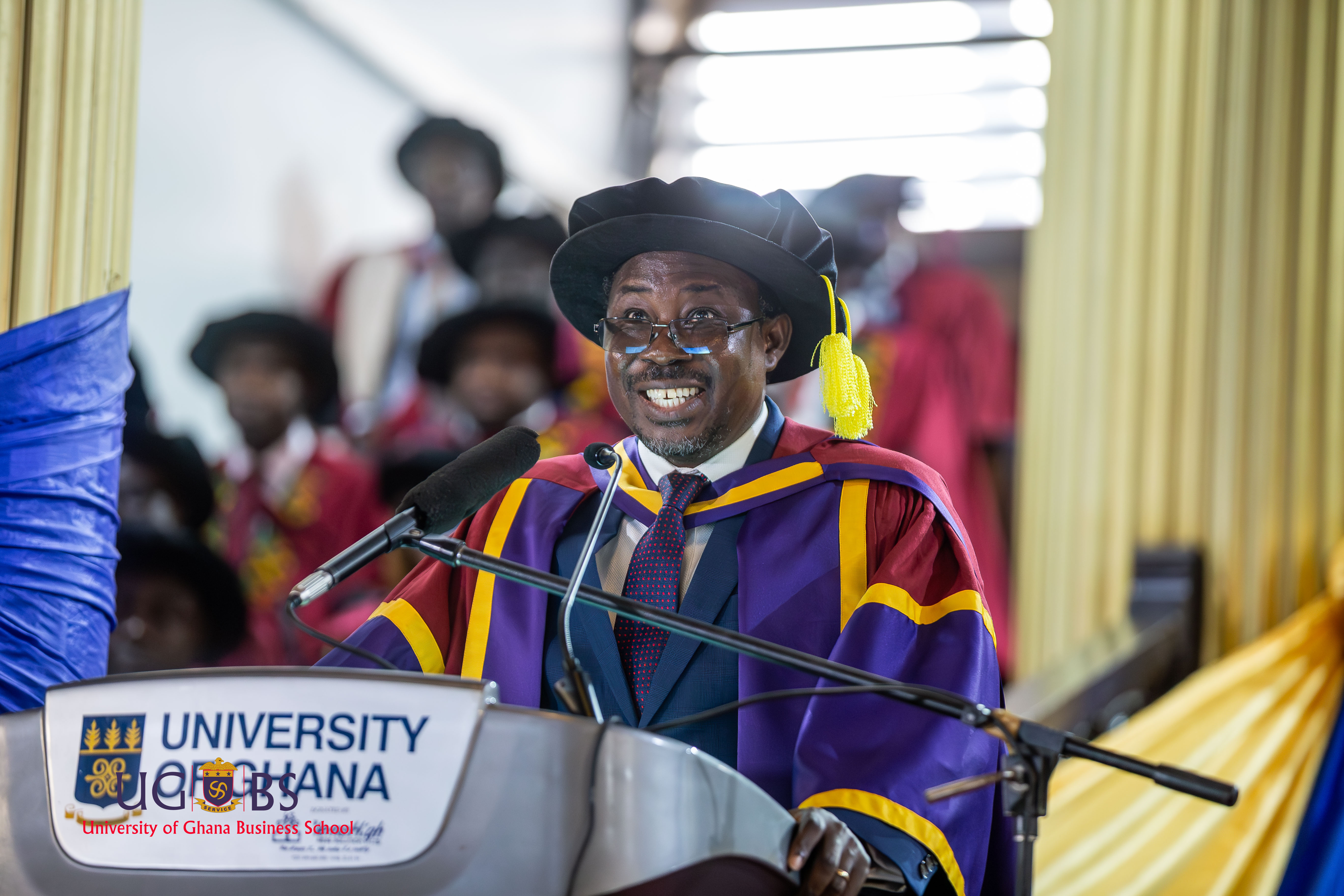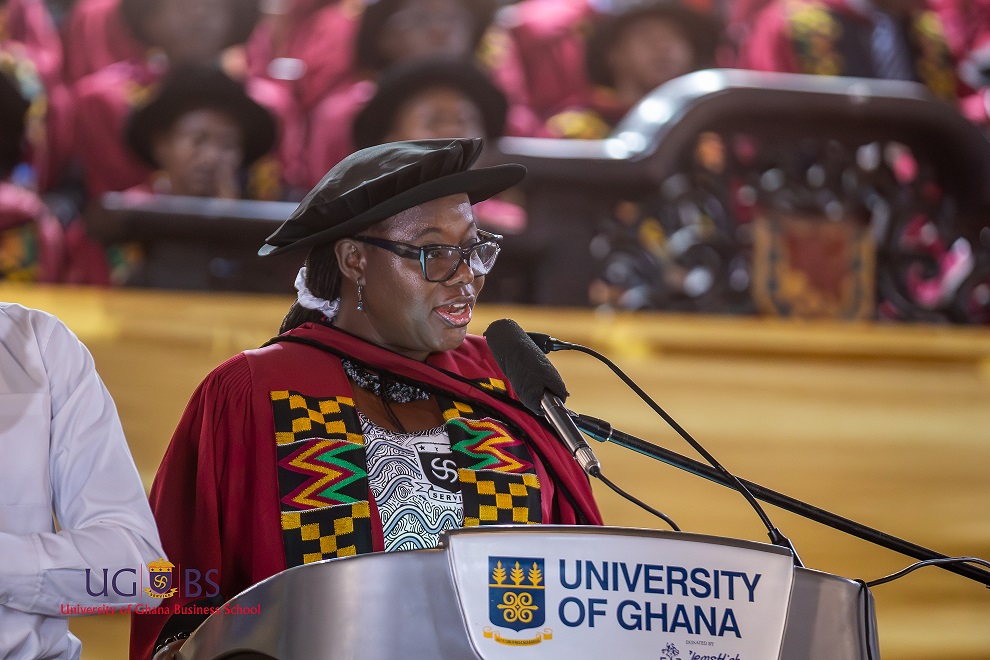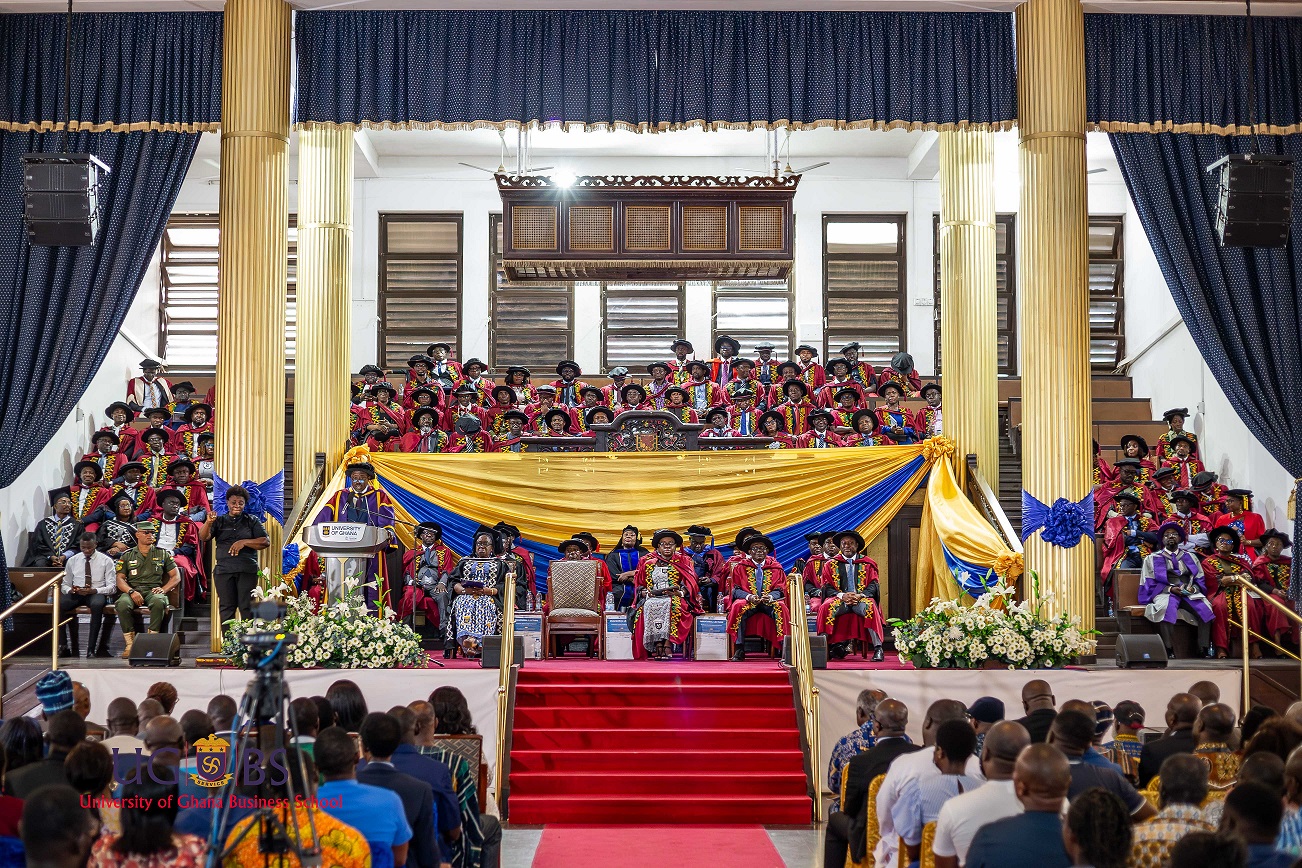
Dean of UGBS Prof. Justice N. Bawole Delivers Inaugural Lecture on Corruption, Ethics, and Public Administration
The Dean of the University of Ghana Business School (UGBS), Prof. Justice Nyigmah Bawole, delivered his inaugural lecture on 10th July 2025, at the Great Hall, University of Ghana. The lecture was titled Our Corruption, Our Ethics, Our Public Administration: Wicked Citizens, Wicked Problems, and Stagnating Development. It offered a compelling examination of Ghana’s development challenges through the lens of ethics, public administration, and the shared complicity of citizens in corruption. The lecture brought together a distinguished audience, including the Vice-Chancellor of UG, Prof. Nana Aba Appiah Amfo, who chaired the occasion, the university community, notable personalities including the Minister for Public Sector Reforms and Member of Parliament for Tempane, Hon. Lydia Lamisi Akanvariva, Chairman of the Church of Pentecost, Apostle Eric Nyamekye, Chairman of the Public Services Commission, Prof. Victor Kwame Agyeman, Registrar of the Medical and Dental Council, Dr.. Divine Ndonbi Banyubala, and his wife, Dr. Lamisi Ndonbi-Mbilla, the Principal of the National Banking College, Madam Gloria Darline Quartey, and the Chief Executive Officer of the Chartered Institute of Bankers, Mr. Robert Dzato. The event also saw the presence of chiefs, members of the clergy, the media, staff and students of UGBS.
In his introductory remarks, Prof. Bawole recounted his journey from humble beginnings in Yeji and Adjentriwa, where he walked over 18 kilometres weekly to attend school, to becoming Dean of Ghana’s premier business school. He shared deeply personal stories of perseverance, sacrifice, and moral conviction, stating: “If there is anyone justified to be corrupt in this country, it certainly should be me, but I chose a path of ethics, zero tolerance for gifts in official capacity, and zero tolerance for corruption.” The lecture, which fulfilled a long-standing University of Ghana tradition requiring professors to present inaugural lectures, reflected on Prof. Bawole’s academic journey and contributions to society. He expressed sincere gratitude to the Vice-Chancellor for her encouragement, mentorship, and support during his tenure as Dean.

Prof. Bawole argued that Ghana’s stagnation is not merely a function of flawed policy or poor technical capacity, but more fundamentally, a moral crisis. He described corruption in Ghana as a pervasive and normalised culture that undermines institutions, erodes trust, and perpetuates underdevelopment. He used historical and comparative data, which contrasted Ghana’s post-independence trajectory with that of South Korea, Malaysia, and Singapore, all of which have since transitioned into high-income economies, while Ghana remains at a lower-middle-income status. He attributed this divergence to Ghana’s failure to cultivate ethical governance and accountable institutions.
Drawing on Peter Ekeh’s ‘two publics’ theory, Prof. Bawole explained the duality of the African identity, where individuals uphold high moral standards within traditional, communal settings but engage in unethical practices when dealing with state institutions. He said this dualism contributes to fragmented public ethics and weakens accountability. He also shared findings from his own studies, including one that showed over 50% of university students would act corruptly if given the chance, and that 51.5% mimicked the unethical behaviour of their superiors. “Our corruption is not accidental or exceptional. It is systemic, generational, and deeply rooted in our collective norms and silences,” he stated. Prof. Bawole lamented the decline of traditional Ghanaian values such as suban pa (good character), where moral worth was once judged by virtues like honesty and compassion, rather than material wealth. He observed that respect and honour have shifted from character to wealth, regardless of how it is obtained. While recognising the commitment of Ghana’s many public servants, he was sharply critical of the public administration system, describing it as weak, politicised, under-resourced, and largely performative. He cited examples from his research on environmental governance and local government, where community participation and accountability mechanisms have become mere formalities.
A particularly striking part of the lecture focused on “Wicked Citizens”, a term he used to confront the moral contradictions of Ghanaian society. He challenged the narrative of national innocence, highlighting widespread complicity in unethical practices, from parents funding cheating in exams to civil servants engaging in petty theft, and policymakers permitting public resources and infrastructure to decay. “Even our cemeteries,” he said, “are abandoned and desecrated. If we love the dead, we must prove it in how we care for their final resting places.” The lecture also addressed the concept of “Wicked Problems”, deeply rooted public issues like corruption and youth unemployment that resist simple solutions. He criticised Ghana’s over-reliance on policy documents and technocratic fixes, arguing that without ethical leadership and civic responsibility, reforms will stay superficial. “What we have is the illusion of policy, not real change,” he asserted.

In his conclusion, Prof. Bawole proposed several bold strategies for fighting corruption and restoring ethical governance, including civic re-education, integrity in the public sphere, ethical leadership development, protect and celebrate whistleblowers, mandatory ethics training, ethical infrastructure, citizen accountability, personal example; where he refused to accept gifts as Dean and reinvested them into student scholarships. The lecture was both a scholarly contribution and a call to the national conscience, challenging all Ghanaians to reflect on their role in fighting corruption and to choose integrity over complicity.